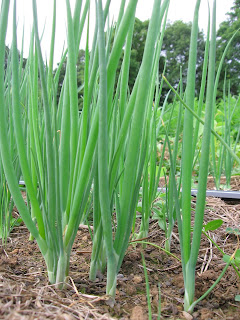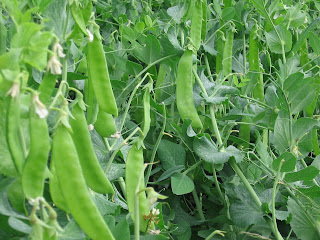 I apologized out loud to one of my eggplants recently. I felt like I had handled him a little too roughly and he deserved an apology. Talking to plants is not an irregular occurrence around here by any stretch of the imagination, especially when I'm left alone in the garden for extended lengths of time. This time, however, it sparked a memory more than 20 years old.
I apologized out loud to one of my eggplants recently. I felt like I had handled him a little too roughly and he deserved an apology. Talking to plants is not an irregular occurrence around here by any stretch of the imagination, especially when I'm left alone in the garden for extended lengths of time. This time, however, it sparked a memory more than 20 years old.During junior high, the neighbor kids and I worked on a melon farm about 2 miles from my house. Our town was known for its yearly Melon Festival and we all spent many summers planting, weeding and picking cantaloupe and watermelons. On one of these humid August days, I was in the field filling baskets when I stepped on a ripe cantaloupe. I automatically turned and apologized to it, then realized how silly I sounded. Farmer Knight's daughter thought it was endearing, but I thought it was just plain embarrassing. How silly to talk to a plant!
Even though I talked to animals of all kinds while growing up, spiders and bumblebees included, I never saw plants in the same way. It wasn't until I nursed an African Violet back to good health in college that I really began to see plants differently. It was the first time I ever felt affection for a plant, talked to it, encouraged it. When I moved to Portland, I left it with a good friend but I always looked forward to visiting it when I returned over the holidays.
These days, I feel more at ease talking to plants, encouraging them, feeling concern for them, and even singing to them on occasion. Although, I'm a little shy about the singing. I'm even learning to listen to them as they tell me what they need in their own plant-like ways. I may not hear them in the same way that I hear the coyotes howl in the ravines or the way David shares a story from the daily news, but when I'm paying attention I can sense what's up.
Early this spring, in a TrackersNW newsletter, founder Tony Deis asked people whether they lived like the land was a member of their family. I thought this was an interesting question because family relationships are so complex. Sometimes they are filled with unconditional love, compassion and support. Sometimes they're destructive, selfish and controlling. Often, they're a complicated mixture of all these qualities. Nevertheless, they are people deeply connected to us, made of the same air, water, minerals, flora and fauna until they return to the earth again and become countless bugs, fungi, raindrops and new people on this churning planet. Even if we choose or haven't been taught to acknowledge their affect on us, effects they have indeed.
Sometimes it takes years of searching, inside and out, to finally figure out the many ways we are affected by our families. If we're lucky, however, someone teaches us at an early age to listen, watch, and communicate without violence to the members of our family, finding ways to love and respect each member as a unique influence on the world. Hopefully, this love extends to ourselves as well.
I was asked recently, by a fellow PSU instructor, if I anthropomorphize the plants in my life. Feeling a bit put on the spot in front of students, I answered "yes, I suppose I do", and then spent some time thinking about it later. I came to this: I want to treat the land like family, which includes attempting to understand it and love it in my own simple human ways. Storytelling is a useful tool to help illuminate and develop this connection. But it's not just about telling stories or dropping simple metaphors. It's remembering that our bodies share the same earth, our ancestor's bodies shared the same earth, and that if I pay attention, they all have something to say. Summed up in academic terms, this may be called anthropomorphism. I'll call it familial love and respect. So I may botch things up with my family once in awhile, fail to listen, do something I wish I hadn't, but I'll always strive for more gentleness, more love, more understanding. And I'll go to bed knowing I've done my best to help all our descendants share the same earth one day.
















